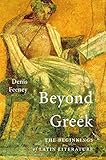Beyond Greek : the beginnings of Latin Literature / Denis Feeney.
Material type: TextPublication details: Cambridge, Massachusetts : Harvard University Press, (c)2016.Description: 1 online resource (xii, 377 pages)Content type:
TextPublication details: Cambridge, Massachusetts : Harvard University Press, (c)2016.Description: 1 online resource (xii, 377 pages)Content type: - text
- computer
- online resource
- 9780674496026
- PA3010 .B496 2016
- COPYRIGHT NOT covered - Click this link to request copyright permission: https://lib.ciu.edu/copyright-request-form
| Item type | Current library | Collection | Call number | URL | Status | Date due | Barcode | |
|---|---|---|---|---|---|---|---|---|
 Online Book (LOGIN USING YOUR MY CIU LOGIN AND PASSWORD)
Online Book (LOGIN USING YOUR MY CIU LOGIN AND PASSWORD)
|
G. Allen Fleece Library ONLINE | Non-fiction | PA3010 (Browse shelf(Opens below)) | Link to resource | Available | ocn933835788 |
Browsing G. Allen Fleece Library shelves, Shelving location: ONLINE, Collection: Non-fiction Close shelf browser (Hides shelf browser)
We take the existence of a literature in the Latin language for granted, but the emergence of this literature is a very strange moment in history. Latin literature should probably not have come into being in the form it took. This book explores the opening phase of Latin literature, from 240 to 140 BCE. The period begins with the first stage productions of Greek plays translated into Latin, which were also the first translations of Greek literary texts into any other language; it closes with the Romans in possession of a large-scale literature in Latin based on the literature of the Greeks, together with a developed historical tradition about their past and a mythology that connected them to the inheritance of the Greeks. The book uses a range of comparative evidence from both the ancient and the modern worlds in order to provide a context for understanding what the Romans did. The book recovers a great range of possibilities for cultural interaction in the ancient Mediterranean, with languages and texts sometimes interchanging quite freely and sometimes being blocked. The book argues that the Roman translation project and the resulting literature were highly anomalous in an ancient context: translation of literature was extremely rare in the world known to the Romans, and the ancient Mediterranean hosted many very successful cultures that had no kind of equivalent to the widely diffused text-based literary systems of the Greeks. The transformation of the Romans' Italian alliance into a Mediterranean imperial power provides the context for the revolution in their cultural life that led to what we call "Latin literature."--
Includes bibliographies and index.
Translation: Languages, scripts, texts -- The Roman translation project -- The Interface between Latin and Greek -- Middle grounds, zones of contact -- A stage for an imperial power -- A literature in the Latin language -- The impact and reach of the new literature -- Acts of comparison -- Conclusion: joining the network.
COPYRIGHT NOT covered - Click this link to request copyright permission:
There are no comments on this title.






